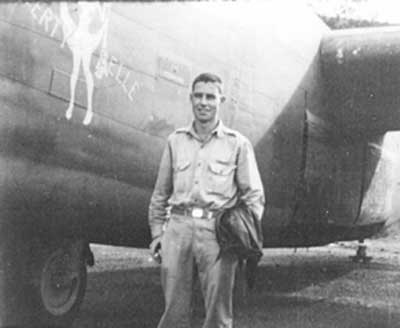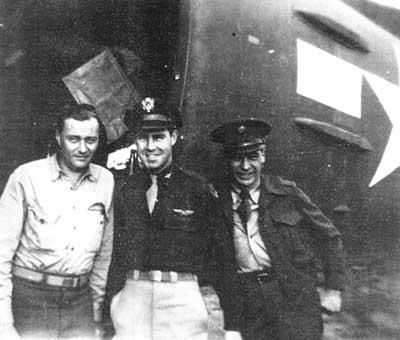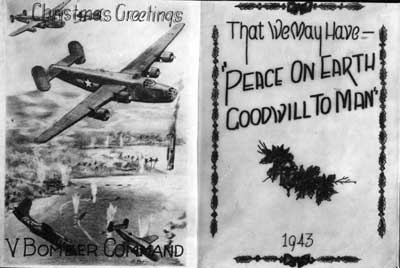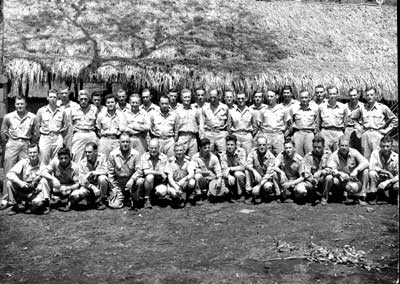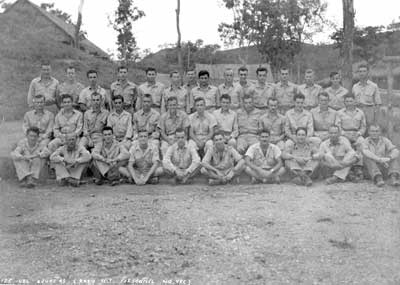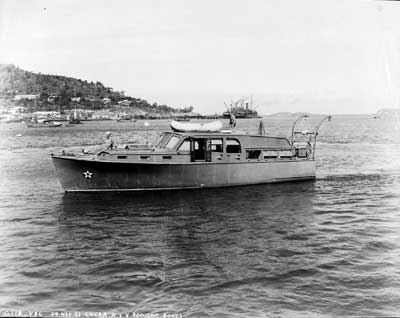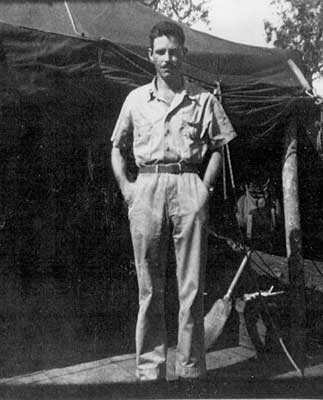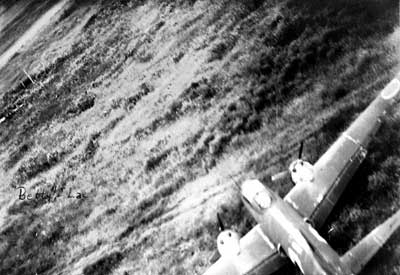Victor W. Grimes, Jr.
5th Bomber Command, Headquarters
U.S. Army Air Force (USAAF)
by Leslie Grimes, daughter
Of Magic doors there is this: They are never seen even as we are passing through.
 It has been a quarter of a century and I still miss my Dad. Several years
ago I unearthed from my mother’s storage closet three large albums of
material from World War II. If I ever knew it was there, I had forgotten. Now
I spent hours and hours poring over photos and newspaper clippings. I
got out my magnifying glass and studied the photos. My Dad had
made his passage into “ the wild blue yonder” with out ever speaking
of his 3 years in the Southwest Pacific. All I knew was that he was a
navigator on airplanes in WWII. I knew this because he used to take us
kids out star gazing and teach us about the constellations. I also knew
that he never wanted to go camping. It has been a quarter of a century and I still miss my Dad. Several years
ago I unearthed from my mother’s storage closet three large albums of
material from World War II. If I ever knew it was there, I had forgotten. Now
I spent hours and hours poring over photos and newspaper clippings. I
got out my magnifying glass and studied the photos. My Dad had
made his passage into “ the wild blue yonder” with out ever speaking
of his 3 years in the Southwest Pacific. All I knew was that he was a
navigator on airplanes in WWII. I knew this because he used to take us
kids out star gazing and teach us about the constellations. I also knew
that he never wanted to go camping.
Looking at the photos of tented communities in
New Guinea, I realized that my Dad had camped literally
for 3 years in the roughest of environments. No wonder he was
not interested in camping! There was no doubt
but that the period these photos covered was pivotal in the life
of our nation and the world. Certainly it was pivotal in my
parents lives - 3 years of war at the beginning of their marriage
- a life together, but not together…. 3 years for my
mother of waiting and watching the newspapers for any scrap of information;
carefully clipping the scraps in an effort to maintain some small
degree of connection to the love of her life and a dream of “happily
ever after”.
5th Bomber Command Photo Album
Click photo for enlargement and caption.
I wanted to know more about the man who had been my
father. What
was his part in this great war that saved the world from tyranny and
preserved the life style which we enjoy
so
much today,
but which cost he and my mother 3 of the best years of their lives….
cost my father his health? This question started me on a journey,
a mission.
If a picture is worth a thousand words, I should have had a lot of
material, but I was having difficulty interpreting the language. Aerial
photos of Gasmata, Balikpapan, Cape Gloucester, Lae, Mindoro,
Wewak, Rapopo, Noumea, Finschhafen, Jefman, Huon Peninsula, Rabaul,
meant nothing to me. There were photos of groups of men, but
they were mostly unidentified. The meaning of these photos was
a mystery. I would have to become a detective in order to search
out “the rest of the story”. A blessed few of the
photos did have names. I could try to locate them. If I could
no longer ask the questions of my Dad, I could ask them, the men in
the photos. Also, there were still veterans left who were assigned
in the same area, who experienced a similar history and who surely
had stories to tell. Pictures of a specific crew or aircraft
were conspicuously absent. With other vets (especially air crews)when
sharing information,specific planes, squadrons, crews, flight
logs,were primary material. My mother’s main recollection
was that he had started the Air/Sea Rescue operations for the 5th Bomber
Command. Without flight log books,personnel records, specific
squadron or Bomb Group information few could help me. I
would have to be a super sleuth in order to find a story.
What
I already knew......
Victor W. Grimes, Jr. was my father’s name. He grew up
in Brooklyn’s Home for Boys not because his parents were
dead, (that might have been more dramatic, more romantic), but because
his parents did not live together and his mother was unable to work
and take care of he and his sisters. His body bore
the scars of having been severely burned - scalded when a nurse, caring
a pan of boiling water for a steam tent to treat his pneumonia, tripped
and spilled the water over his six year old body. Fortunately,
his arm was covering his sleeping face at the time. He grew into
a handsome young man who captained the church basketball team where
he caught my mother’s eye. She was 5 years younger than
he was, but my mother’s mother was drawn to him, too, and set
her sights on him as a son-in-law and husband for her only daughter. When
the war came he was attending New York’s City College at night,
living with friends he had roomed with at the orphanage and dating
my mother. In June 1941 he was inducted into the Army where he
was initially trained as a radio operator at Fort Monmouth, New Jersey. Later,
he was fortunate enough to get into pilot flight training. Trying
to landing the plane 50 feet above the ground ( a problem related to
poor depth perception) caused him to wash out of the pilot training
and to be sent to navigation school.. When he finished B-26 training
at Barksdale and Harding Fields, Louisana he was given a furlough before
being sent overseas. He returned to New York City
to marry Mother in July of 1942 just weeks before he left to
go overseas to the South Pacific.
What
I learned......
The USS Mount Vernon (AP-22) left San Francisco on September 23, 1942 carrying several thousand soldiers across the equator on Sept. 30,
the International
date line on October 5, 1942 finally arriving in Sydney, Australia on October
8, 1942. The
Australians, though happy to see them, were unprepared for this huge
influx of American soldiers. The only place large enough
to accommodate them was the horse race track. They slept in
bunks, in stalls, wherever they could find a spot. Later they
traveled north up the coast by train and by truck to Townsville.
Bustling
chaos was the order of the day in Townsville. It
was a huge, sprawling tent city. Veteran pilot Robert Jones
recalls they were asked what type of aircraft the new pilots wanted
to fly, fighters or bombers. It was an unsettling question
for the new recruits. But the powers were just happy to see fliers
of any type. The answer to the question determined where the
guys went next. Jones chose bombers. Obviously fighters
didn't use navigators. Jones and my Dad were both sent to Reid
River to the 2nd Squadron of the 22nd Bomb Group. Robert Jones
would eventually become the CO of the outfit, while my father after
only a couple months was transferred to operations of the headquarters
of the 5th Bomber Command. Perhaps, his prior "signals" background
had something to do with that.5th Bomber Command moved
it's headquarters to Port Moresby, New Guinea the first week of December
1942 which is documented by the group photo of General Walker and
his staff among my Dad's photos.
Quote from General Kenney in The MacArthur I know
The average guy lost 15-30lbs within the first months he arrived
in New Guinea.. They slept on army cots on an air mattress
with mosquito netting. There were slit trenches directly
outside the tent into which they jumped to avoid shrapnel and injury
from the frequent bombing strikes of Japanese Betty bombers. The
Japanese bombers couldn't target much accurately from 20,000
feet so they essentially peppered the area just for nuisance value,
hoping to hit something. They didn’t usually do significant
damage, but the runs did serve to jangle nerves and disrupt sleep.
Did you know Victor Grimes?
Contribute
Information
References
NARA -
World War II Army Enlistment Records - Victor W. Grimes, Jr.
FindAGrave - Victor W. Grimes (grave photo)
|

